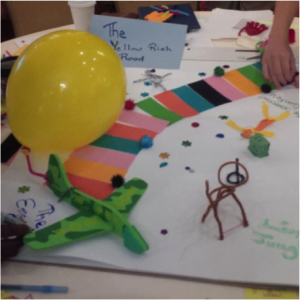Today at the Social Innovation Fund Grantee Convening we started with a design workshop challenge. We were asked to create a prototype for a communication tool targeted at a specific consumer. For our team, this was “Evidence Eva” a Ph.D. level evaluator with 20 years of prior experience who wants rigor in evaluations and is risk averse.
As a group, we decided that our goal was to help Eva see the upside of risk. To do this we designed a game called “Yellow Risk Road” in which Dorothy has to get to the Wizard of Oz by solving some social issues. She had the choice of low, moderate and high risk answers and the number of spaces she was able to advance varied by the level of risk.
The exercise was fun and we placed sixth out of 14 in voting for the best prototype. Beyond that, it got me thinking about risk as it relates to the Social Innovation Fund. As Wendy Spencer, the CEO of the Corporation for National and Community service, related to us yesterday, the Social Innovation Fund was a totally new idea when it was launched in 2009. Giving federal dollars to granting agencies so that they could leverage money through private and public matching dollars and then invest them in promising programs to solve the country’s toughest social problems was a risky idea. What if the programs turned out to be unfeasible or ineffective? What if the agencies could not meet the matches? What if there was (deep breath) a waste of government money?
In his Ted Talk about breaking down risks, professional kayaker Steve Fisher discusses being in a huge stadium and suspending a rope from one of the arches, and then swinging across the stadium in his kayak on that rope. He notes that one of the questions that the audience might ask is “What if the rope breaks?” Which really means “Isn’t that too risky?”
We have to admit, the KITS Social Innovation Fund that was just awarded to United Way of Lane County (UWLC) in collaboration with OSLC is not without its own risks. UWLC has to raise a $1 million match to the federal funds every year and each sub-grantee will have to match their grant dollars. That’s not a small task. Then the sub-grantees will need to have KITS teams trained and start the program in their schools (in some cases from scratch). This could raise all sorts of “what ifs”: What if UWLC can’t raise the match, what if the sub-grantees can’t, what if they can’t learn the program, what if the proverbial rope breaks?
Fisher talks about how extreme adventurers prepare for risks. They “demystify” them — taking a seemingly crazy idea, breaking it down into smaller steps, and then figuring out how each step individually might be attainable. So the rope won’t break because they select a type that holds thousands more pounds than will need to be suspended. Then they tackle the issue of how long the rope needs to be so that the kayak won’t hit the ground. That’s a relatively simple mathematical formula. Then they tackle other issues of safety and so on. If you break down the risks and address each one, things stop looking scary and start looking like fun.
This breaking down of steps is possible with the KITS Social Innovation Fund as well. We have been thinking and strategizing about matches for quite a while now and have come up with a range of creative ideas that are being put into place. We also know that we have many dynamic thinkers in social and philanthropic agencies and school districts throughout Lane County who will contribute to the conversation.
As to learning the program, the KITS Team has created a range of training materials as well as ongoing technical assistance materials that will aid in implementing the program. Additionally, there will be two technical assistance workshops held at United Way of Lane County to answer other questions about the KITS Program and the Social Innovation Fun grant: one on Tuesday, September 22 at 12-2 pm for agencies that are thinking of applying as single entities and one on Thursday, September 24 at 12-2 pm for agencies that are thinking of applying as multiple entities.
But what if we have not thought of everything? What if there is a loose bolt in the arch to which the rope is tied? Fisher says that in kayaking when the unexpected occurs, you cannot panic: “….you have no choice but to solve the problem and keep on moving.” But he also notes that with planning, it is often possible to foresee these hitherto unknown risks and take a different path instead.
He adds that part of addressing risk is being willing to change an idea if it proves to be too risky. The premise is not “never give up”, but instead “don’t give up too easily”. What I like about this is the focus on movement and flexibility, of being able to make choices about when to persist and when to adjust course. And it all comes from understanding the risks.
We have not yet gotten to the most important point, the reason we take the risks in the first place, the “upside” — the rewards. We do not risk for nothing. With the Social Innovation Fund, the potential rewards are many. For UWLC, the KITS Program, and all of the sub-grantees, they include recognition of the work at a national level, greater access to more potential partners and funders, and most importantly, the potential to change lives for the better.
Fisher notes that whether in kayaking or in changing the world “…the principle is always the same. We need to buck up and add our piece to the puzzle.” We know that if we do nothing, risk nothing, things are likely to stay the same; the achievement gap that many children experience from the beginning of school will still be there five, 10, or 15 years from now. With some planning, we can foresee and mitigate many the potential risks of the Social Innovation Fund grants. It seems like the wellbeing of Lane County’s 3000 kindergarteners is worth the risks that might remain.
To view the Steve Fisher Ted Talk referenced here, go to https://www.youtube.com/watch?feature=player_embedded&v=dcdXzQq84PU





